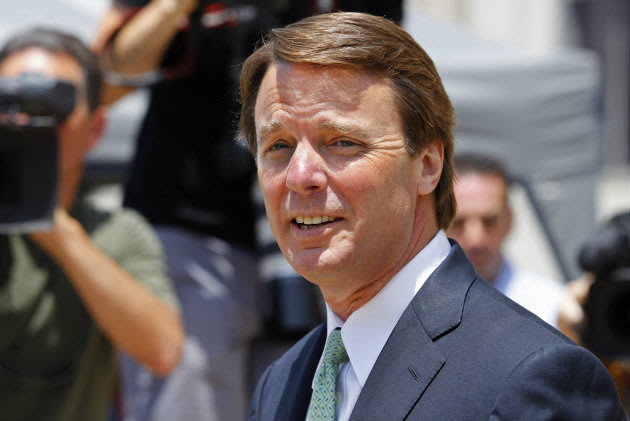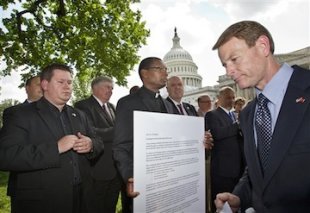BEIRUT (AP) — When the gunmen began to slaughter his family, 11-year-old
Ali el-Sayed says he fell to the floor of his home, soaking his clothes
with his brother's blood to fool the killers into thinking he was
already dead.
The Syrian boy tried to stop himself from trembling, even as the gunmen, with long beards and shaved heads, killed his parents and all four of his siblings, one by one.
The youngest to die was Ali's brother, 6-year-old Nader. His small body bore two bullet holes — one in his head, another in his back.
"I put my brother's blood all over me and acted like I was dead," Ali told The Associated Press over Skype on Wednesday, his raspy voice steady and matter-of-fact, five days after the killing spree that left him both an orphan and an only child.
[Related: Allies expel Syrian diplomats]
Ali is one of the few survivors of a weekend massacre in Houla, a collection of poor farming villages and olive groves in Syria's central Homs province. More than 100 people were killed, many of them women and children who were shot or stabbed in their houses.
The killings brought immediate, worldwide condemnation of President Bashar Assad, who has unleashed a violent crackdown on an uprising that began in March 2011. Activists say as many as 13,000 people have been killed since the revolt began.
U.N. investigators and witnesses blame at least some of the Houla killings on shadowy gunmen known as shabiha who operate on behalf of Assad's government.
Recruited from the ranks of Assad's Alawite religious community, the militiamen enable the government to distance itself from direct responsibility for the execution-style killings, torture and revenge attacks that have become hallmarks of the shabiha.
In many ways, the shabiha are more terrifying than the army and security forces, whose tactics include shelling residential neighborhoods and firing on protesters. The swaggering gunmen are deployed specifically to brutalize and intimidate Assad's opponents.
Activists who helped collect the dead in the aftermath of the Houla massacre described dismembered bodies in the streets, and row upon row of corpses shrouded in blankets.
"When we arrived on the scene we started seeing the scale of the massacre," said Ahmad al-Qassem, a 35-year-old activist. "I saw a kid with his brains spilling out, another child who was no more than 1 year old who was stabbed in the head. The smell of death was overpowering."
The regime denies any responsibility for the Houla killings, blaming them on terrorists. And even if the shabiha are responsible for the killings, there is no clear evidence that the regime directly ordered the massacre in a country spiraling toward civil war.
As witness accounts begin to leak out, it remains to be seen what, exactly, prompted the massacre. Although the Syrian uprising has been among the deadliest of the Arab Spring, the killings in Houla stand out for their sheer brutality and ruthlessness.
According to the U.N., which is investigating the attack, most of the victims were shot at close range, as were Ali's parents and siblings. The attackers appeared to be targeting the most vulnerable people, such as children and the elderly, to terrorize the population.
This type of massacre — even more than the shelling and mortar attacks that have become daily occurrences in the uprising — is a sign of a new level of violence. By most accounts, the gunmen descended on Houla from an arc of nearby villages, making the deaths all the more horrifying because the victims could have known their attackers.
According to activists in the area, the massacre came after the army pounded the villages with artillery and clashed with local rebels following anti-regime protests. Several demonstrators were killed, and the rebels were forced to withdraw. The pro-regime gunmen later stormed in, doing the bulk of the killing.
Syrian activist Maysara Hilaoui said he was at home when the massacre in Houla began. He said there were two waves of violence, one starting at 5 p.m. Friday and a second at 4 a.m. Saturday.
"The shabiha took advantage of the withdrawal of rebel fighters," he said. "They started entering homes and killing the young as well as the old."
Ali, the 11-year-old, said his mother began weeping the moment about 11 gunmen entered the family home in the middle of the night after arriving in a military armored vehicle and a bus. The men led Ali's father and oldest brother outside.
"My mother started screaming 'Why did you take them? Why did you take them?'" Ali said.
Soon afterward, he said, the gunmen killed Ali's entire family.
As Ali huddled with his youngest siblings, a man in civilian clothes took Ali's mother to the bedroom and shot her five times in the head and neck.
"Then he left the bedroom. He used his flashlight to see in front of him," Ali said. "When he saw my sister Rasha, he shot her in the head while she was in the hallway."
Ali had been hiding near his brothers Nader, 6, and Aden, 8. The gunmen shot both of them, killing them instantly. He then fired at Ali but missed.
"I was terrified," Ali said, speaking from Houla, where relatives have taken him in. "My whole body was trembling."
Ali is among the few survivors of the massacre, although it was impossible to independently corroborate his story. The AP contacted him through anti-regime activists in Houla who arranged for an interview with the child over Skype.
The violence had haunting sectarian overtones, according to witness accounts. The victims lived in the Houla area's Sunni Muslim villages, but the shabiha forces came from a nearby area populated by Alawites, an offshoot of Shiite Islam.
Most shabiha belong to the Alawite sect — like the Assad family and the ruling elite. This ensures the loyalty of the gunmen to the regime, because they fear they would be persecuted if the Sunni majority gains the upper hand.
Sunnis make up most of Syria's 22 million people, as well as the backbone of the opposition. The opposition insists the movement is entirely secular.
It was not possible to reach residents of the Alawite villages on Wednesday. Communications with much of the area have been cut off, and many residents have fled.
Al-Qassem, the activist who helped gather corpses in Houla, said the uprising has unleashed deep tensions between Sunnis and Alawites.
"Of course the regime worked hard to create an atmosphere of fear among Alawites," said al-Qassem, who is from the Houla area, although not one of the villages that came under attack over the weekend. "There is a deep-seated hatred. The regime has given Alawites the illusion that the end of the regime will spell the end of their villages and lives."
He said the army has been pouring weapons into the Alawite areas.
"Every house in each of those Alawite villages has automatic rifles. The army has armed these villages, each home according to the number of people who live there," he said, "whereas in Houla, which has a population of 120,000, you can only find 500 0r 600 armed people. There is an imbalance."
Days after the attack, many victims remain missing.
Ali can describe the attack on his family. But al-Qassem said the full story of the massacre may never emerge.
"There are no eyewitnesses of the massacre," he said. "The eyewitnesses are all dead."
___
Associated Press writer Zeina Karam contributed to this report.







